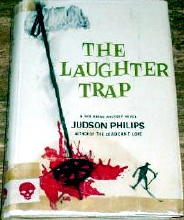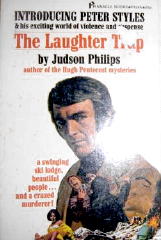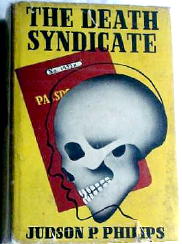Fri 5 Dec 2008
A 1001 MIDNIGHTS review: JUDSON PHILIPS – The Laughter Trap.
Posted by Steve under 1001 Midnights , Authors , Characters , ReviewsNo Comments
JUDSON PHILIPS – The Laughter Trap. Dodd Mead, hardcover, 1964. Hardcover reprint: Detective Book Club [3-in-1 edition], December 1964. Paperback reprint: Pinnacle P154N, January 1973.

Although his work as Hugh Pentecost is better known, Judson Philips has published some excellent novels of suspense and detection under his own name, and created one notable series character — Peter Styles, a national columnist for Newsview magazine who specializes in human-interest stories.
The Laughter Trap is the first of many novels featuring Styles and dramatizes the tragic events that irrevocably altered the shape of his life and career.
While on their way home from the Darlbrook Lodge in the Green Mountains of Vermont, Styles and his elderly father, Herbert, a successful but alcoholic advertising executive, are forced off the road by two thrill killers. Herbert Styles dies in the fiery wreck; Peter is thrown free, but sustains a serious injury that forces doctors to amputate his right leg halfway between the ankle and the knee.

He recovers with the help of a former lover, Liz Connors, whose husband is a doctor specializing in prosthetic devices. His new artificial leg allows him to move around with only the slightest limp, and once he has recovered, he devotes his life to an ongoing search for the men who cost him his father and his leg. His only clue is the “hideous high giggling laugh” he heard before the crash.
All of this is told in flashback and through conversations with others as Styles returns a year later to Darlbrook Lodge. He has wired for private accommodations, but ends up sharing a room with the lodge’s publicity man, Jim Tranter, through whose eyes we view the rest of the story.
Styles’s first evening at the lodge is without unusual incident — until he awakens Tranter in the middle of the night, claiming he has again heard the hideous laughter. In the morning, a much more disturbing event is revealed: Two young women staying in one of the cabins — Jane Pritchard and Martha Towers have been brutally stabbed to death. Jane Pritchard’s father appears on the scene, accompanied by his other daughter, Laura, and offers a reward for the apprehension of the slayer.
Styles interests himself in the investigation, believing the killings and the laughter he heard have a connection. By the time he solves the grisly double homicide, the usually peaceful atmosphere of the mountain lodge has been disrupted by yet another killing, an attempted murder, a melee in the bar, and dangerous undercurrents of hatred and suspicion. But while Styles finds satisfaction in the resolution of the case, he finds only frustration in his search for the driver of the car who took his father’s life.

Styles continues his quest in such other novels as The Twisted People (1965), Nightmare at Dawn (1970), Walk a Crooked Mile (1975), and Why Murder (1979).
Of the other series characters created by Philips under his own name, the most interesting are Carole Trevor of the Old Town Detective Agency and her ex-husband, wealthy man-about-town Maxwell Blythe, who appear in two early mysteries: The Death Syndicate (1938) and Death Delivers a Postcard (1939).
———
Reprinted with permission from 1001 Midnights, edited by Bill Pronzini & Marcia Muller and published by The Battered Silicon Dispatch Box, 2007. Copyright © 1986, 2007 by the Pronzini-Muller Family Trust.